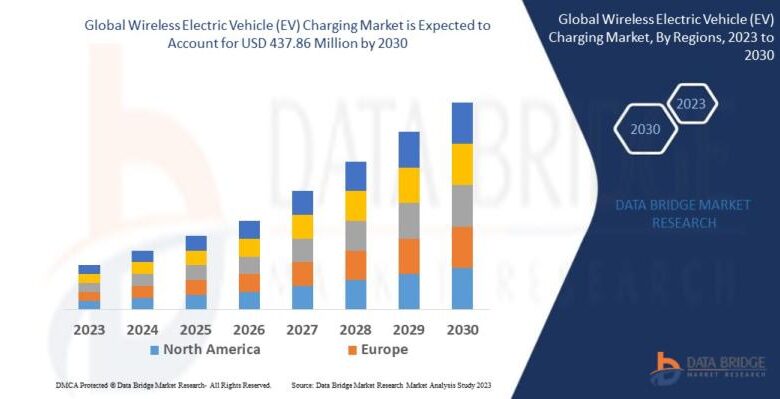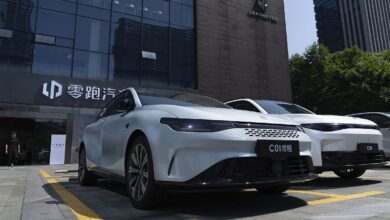Wireless Electric Vehicle (EV) Charging Market to Exhibit

The Wireless Electric Vehicle (EV) Charging Market is a burgeoning sector characterized by its expansive scope and rapid growth across various industries. With a diverse range of applications spanning biotechnology, renewable energy, artificial intelligence, and more, the market size and share continue to expand due to increasing demand for innovative solutions. Industry statistics reveal robust growth trajectories, fueled by investments in research and development (R&D) and technological advancements.
Industry leaders within the Wireless Electric Vehicle (EV) Charging Market are pivotal in driving growth, leveraging insights from comprehensive research reports and revenue analyses. These leaders strategically position themselves to capitalize on emerging opportunities and navigate challenges such as regulatory complexities and market volatility. Graphs depicting revenue forecasts underscore the market’s dynamic nature and future scope, highlighting opportunities for companies to innovate and capture market share.
Data Bridge Market Research analyses that the wireless electric vehicle (EV) charging market, valued at USD 15 million in 2022, will reach USD 437.86 million by 2030, growing at a CAGR of 52.46% during the forecast period of 2023 to 2030.
Explore Further Details about This Research Wireless Electric Vehicle (EV) Charging Market Share Report https://www.databridgemarketresearch.com/reports/global-wireless-ev-charging-market
This Wireless Electric Vehicle (EV) Charging Market report Segments Market growth rate, market shares, market size is also being highlighted in this report.
Global Wireless Electric Vehicle (EV) Charging Market, By Propulsion Type (Battery Electric Vehicle (BEV), Plug-In Hybrid Electric Vehicle (PHEV), Commercial EV) Charging, System (Magnetic Power Transfer, Inductive Power Transfer, Capacitive Power Transfer) Charging Type (Dynamic Wireless Charging System, Stationary Wireless Charging System, Component (Base Charging Pad, Power Control Unit, Vehicle Charging Pad, Battery Management Systems), Power Supply (3-11KW, 11-50KW, Less than 50KW) Vehicle Type (Passenger Vehicles , Commercial Vehicle, Others), Distribution Channel (Aftermarket, OEM) Charging Method (Capacitive Wireless Power Transfer (CWPT), Magnetic Gear Wireless Power Transfer (MGWPT) ,Resonant Inductive Power Transfer (RIPT), Inductive Power Transfer (IPT)) Application (Commercial Charging Stations, Home Charging Unit) – Industry Trends and Forecast to 2030.
Prominent market player analysis-
The report profiles noticeable organizations working in the water purifier showcase and the triumphant methodologies received by them. It likewise reveals insights about the share held by each organization and their contribution to the market’s extension. This Global Wireless Electric Vehicle (EV) Charging Market report provides the information of the Major Key Players in the market their business strategy, financial situation etc.
ABB (Switzerland), Alfen N.V. (Netherlands), Allego B.V. (Netherlands) ,Siemens (Germany), EVgo Services LLC. (U.S.), Leviton Manufacturing Co., Inc. (U.S.), Continental AG (Germany), Qualcomm Technologies, Inc (U.S.), TOYOTA MOTOR CORPORATION (Japan), Bombardier (Canada), WiTricity Corporation. (U.S.), HELLA GmbH & Co. KGaA (Germany), TOSHIBA CORPORATION (Japan), ZTE Corporation (China), WiTricity Corporation (U.S.), Momentum Dynamics Corporation (U.S.), Qualcomm Incorporated (U.S.), Continental AG (Germany), Evatran Group Inc. (U.S.), Plugless Power Inc. (U.S.), Chargemaster plc (U.K.)
Market Definition
Smart wireless charging technology for electric vehicles eliminates the need for extension cords and cumbersome wired connections. This system enhances the convenience of charging EVs at home or work by offering a seamless and hassle-free experience. With smart technology, EV owners can simply park their vehicles over a charging pad, enabling efficient and effortless charging without the limitations of wired charging systems.
Wireless Electric Vehicle (EV) Charging Market Dynamics
Drivers
Advantages of wireless charging over wired charging
Wireless charging offers several advantages over traditional wired charging methods. It eliminates the need for physical cables and connectors, providing a seamless and convenient charging experience. With wireless charging, there is no risk of wear and tear or damage to charging cables. It also enhances safety by reducing the risk of electric shock. Additionally, wireless charging enables greater flexibility and convenience, allowing for effortless charging without the need for precise alignment or physical connections.
Increasing support from governments for wireless charging
Governments worldwide are recognizing the potential of wireless charging for electric vehicles (EVs) and are actively supporting its development. With tax relaxation and financial incentives, governments aim to encourage the adoption of EVs and the deployment of wireless charging infrastructure. The advantages of wireless charging, including increased convenience, enhanced safety, and reduced reliance on charging stations, have attracted significant attention. For instance, a company called Char.gy received a substantial investment of USD 3.01 million to implement wireless charging technology on residential streets, further driving the advancement of this promising EV charging solution.
Opportunities
Technological advancements
The wireless electric vehicle charging market is witnessing continuous technological advancements, such as improved efficiency, higher power transfer capabilities, and longer charging distances. These advancements enhance the feasibility and attractiveness of wireless EV charging solutions. Ongoing research and development efforts present opportunities for innovation and the introduction of more efficient and advanced wireless charging technologies.
Collaborations and partnerships
Collaboration between automakers, charging infrastructure providers, and technology companies can drive the growth of the wireless EV charging market. Partnerships can facilitate the integration of wireless charging capabilities into electric vehicle models, expand the charging network, and improve interoperability between different charging systems. Collaborations can accelerate the adoption of wireless charging and create a more seamless and interconnected charging ecosystem.
What insights readers can gather from the Wireless Electric Vehicle (EV) Charging Market report?
Learn the behavior pattern of every Wireless Electric Vehicle (EV) Charging Market-product launches, expansions, collaborations and acquisitions in the market currently.
Examine and study the progress outlook of the global Wireless Electric Vehicle (EV) Charging Marketlandscape, which includes, revenue, production & consumption and historical & forecast.
Understand important drivers, restraints, opportunities and trends (DROT Analysis).
Important trends, such as carbon footprint, R&D developments, prototype technologies, and globalization.
Browse Related Reports:
https://trendtrackershub25.blogspot.com/2024/06/fiberglass-reinforced-plastics-frp-dual_18.html
https://trendtrackershub25.blogspot.com/2024/06/failure-analysis-demand-growth-share.html
https://trendtrackershub25.blogspot.com/2024/06/earphones-industry-statistics-growth.html
https://trendtrackershub25.blogspot.com/2024/06/dairy-starter-culture-trends-growth.html
Contact Us:
Data Bridge Market Research
US: +1 614 591 3140
UK: +44 845 154 9652
APAC : +653 1251 975
Email: corporatesales@databridgemarketresearch.com
“
About Data Bridge Market Research:
Data Bridge set forth itself as an unconventional and neoteric Market research and consulting firm with unparalleled level of resilience and integrated approaches. We are determined to unearth the best market opportunities and foster efficient information for your business to thrive in the market. Data Bridge endeavors to provide appropriate solutions to the complex business challenges and initiates an effortless decision-making process.
This release was published on openPR.



